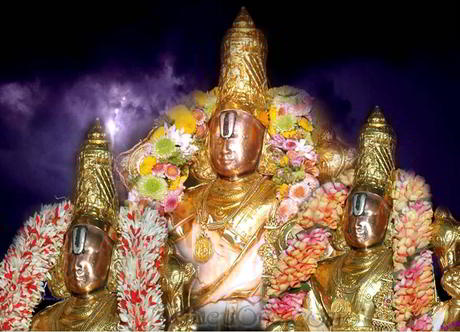
ingitam nimishitam ca tAvakam
ramyam adbhutam atipriyankaram |
tena kamsamukha kITaSAsanam
sundara alpakamapi praSasyate ||In this Slokam, KUresar points out that even small signs from the Lord have big effects and are beneficial for the world.
Meaning:
Oh Sundara! Your meaningful gestures (ingitam), glances including the winking of the eyes, uplifting of the eye brows and other ceshTitams are beautiful to behold. They confer lot of auspiciousness on the world and its beings. These led to the destruction of insignificant worms (non-entities) like Kamsan, Denukan and others. Even if they are small acts, they are praised by the righteous ones.
Comments:
This Slokam is an elaboration of SrI MahA BhAshyakArar Patanjali’s sUtram: “ingitena nimishitena ca AcAryANAm pravrttiranumIyate”. The ingitam, nimishita-ceshTitams of the great ones are auspicious and beautiful says MahA BhAshyakArar. ingitam is hinting without body movement. nimishitam is the message conveyed by eye movement and winking. ceshTitam is movement of the hands et al.
The YAdavAbhudaya Slokam (10.79) refers to the mightiness of the Lord and the insignificance of His enemies. Kamsan was a little mosquito before the Lord, who is like an elephant. A very small act by the elephant will totally destroy the mosquito. Swamy Desikan says: If any one wonders about this little acts causing such mighty damage, we have to wonder about the wonderers themselves: “masakAniva mAtanga: kamsa-mukhyAn-imAn kshipan, yadi vismayanIyastvam vismaye kim na vismAya:”.

vArANasIdahana paunDraka bhaumabhangakalpadrumAharaNa
Sankara jrumbhaNAdyA: |
anyA: ca bhArata bala krathanAdayaste
krIDA: susundarabhuja! SravaNAmrtAni ||KUresar wants to conclude the coverage of KrshNAvatAram quickly and condenses many wondrous incidents associated with that avatAram in this Slokam.
Meaning:
Oh Susundarabhuja! Your great heroic deeds – the burning of KAsi city of KAsi rAjan (vArANAsi dahanam) with Your sudarSanam, the destruction of PauNDra vAsudevan who ran around declaring that He was Para vAsudevan (pauNDraka bhangam), the killing of NarakAsuran, the son of BhUmi Devi and making Sivan succumb to jrmbhaNAstram in the bANAsura Yuddham and the elimination of akshauhiNi army in the BhArata Yuddham – are delectable to hear and reflect upon. Those deeds are SravaNAmrtam for me says KUresar (te krIDA: SravaNAmrtAni). This state of feeling by KUresar follows that of Swamy NammAzhvAr’s TiruvAimozhi: 3.8.6 –
செவிகளால் ஆரநின் கீர்த்திக் கனியென்னும்
கவிகளே காலப்பண் தேனுறைப் பத்துற்று,
புவியின்மேல் பொன்னெடுஞ் சக்கரத் துன்னையே
அவிவின்றி யாதரிக் கும்என தாவியே
tvam hi sundara! vanAdrinAtha! he
venkaTAhvaya nagendra mUrdhani |
deva sevita padAmbuja dvaya:
samSritebhya iha tishThase sadA ||After completing KrshNavatAram in the series on daSAvatAram, Kalki avatAram should be next covered. We will come to that in Slokam 120. Meanwhile, propelled by the thought about the closeness between arcAvatArams and Vibhava avatArams, KUresar pays his tributes to the arcA murtis at Srirangam, tiruvenkaTam and Kaanci. KUresar chooses tiruvenkaTam first although traditionally Srirangam is considered as the first divya desam. Commentators say the choice was made because both tiruvenkaTam and TirumAlirumcOlai are known as Vrsha Giri and SimhAdri. tiruvenkaTam and TirumAlirumcOlai located on the north and the south of Tamizh nADu are like the two breasts of PirATTi (tennan uyar poruppum deiva vaDa malaiyum ennum ivaiyE mulayA vaDivamainta anna naDaiya aNangE).
Meaning:
Oh Sundara! VanAdri nAtha! Thou art standing on top of the tiruvenkaTa giri (deiva vaDa malai) as Your sacred feet are worshipped by the celestials and You provide Your nirantara (permanent) sevai at Solai Malai (tennan uyar poruppu) for those, who seek Your refuge.
Comments:
Oh SundarabAhu! At the sikharam of tiruvenkaTam Hill, Your lotus feet are worshipped by the devAs (venkaTAhvaya nagendra mUrdhani tvam deva sevita padAmbuja dvaya:). Here at TirumAlirumcOlai in the south, You present Yourself always to those, who seek Your refuge (iha, samSritebhya: sadA tishThase hi).
Source:
Oppiliappan KOil Sri Varadachari SaThakOpan Swami












